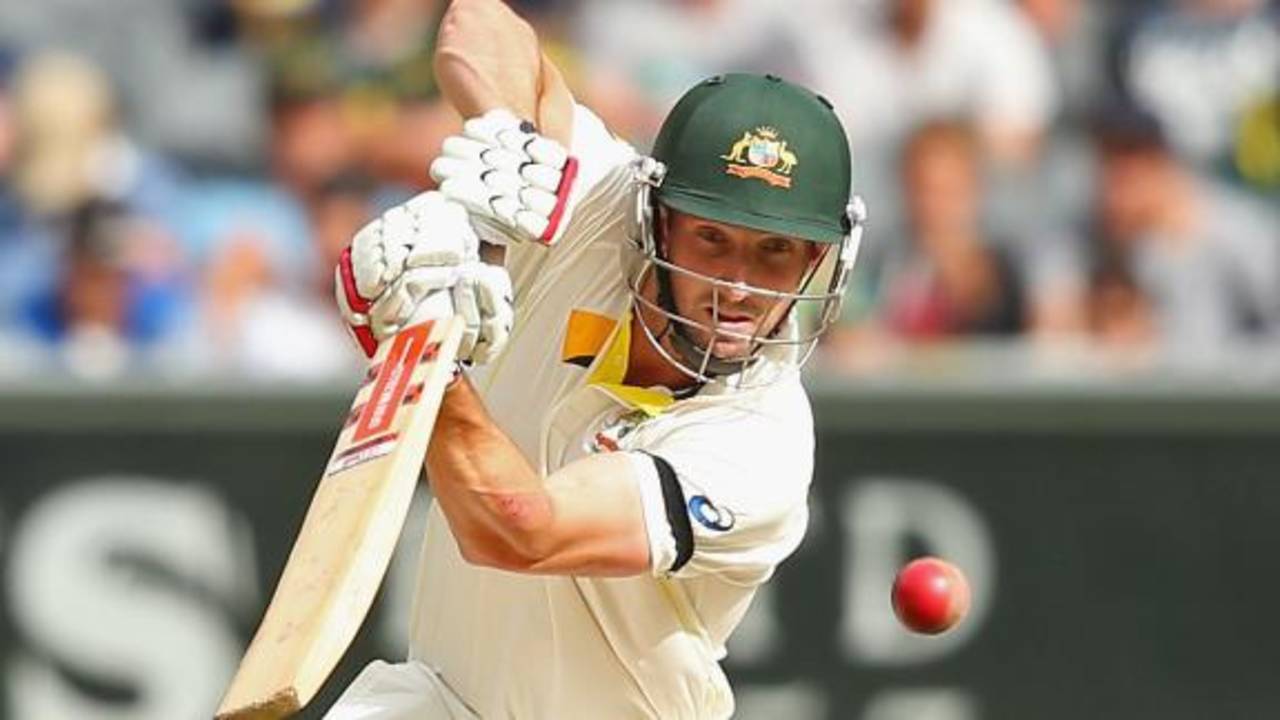Marsh battles for job security
Some might say Shaun Marsh has got more chances than he deserves at Test level, but at the MCG he played an innings of great value to Australia, and his career
Brydon Coverdale at the MCG
29-Dec-2014
Shaun Marsh is easy to forget. In the MCG nets before this match, all eyes were on David Warner as he tested his sore thumb against some throwdowns. Several layers of mesh obscure the view somewhat from the media area, and someone asked who was the left-hander in the net next to Warner. After some thinking time, people realised it was Marsh. Oh yeah, he's here too.
Marsh doesn't chirp at the Indians in the field. He says little of interest when interviewed. He doesn't bowl. At the Gabba he made 32 and 17, middling enough scores to mean that he wasn't derided as a dud, nor hailed as a hero. His most conspicuous moments came when he put down two regulation chances in the field, positioning his hands awkwardly on both occasions.
In a Test that featured his brother Mitchell taking his first wicket, Steven Smith scoring a century, Chris Rogers making a pair of fifties, Shaun was the other Marsh, the other batsman, the other guy. Flying under the radar can be a blessing, for a while. But had Marsh continued the same way in Melbourne and Sydney he would likely have been dropped for the third time in a short Test career.
At the SCG, Marsh's first-class record is woeful. His scores there have been 29, 14, 0, 6, 34, 0, 4, 2 and 0. In five first-class matches at the ground, he averages 9.88. Stuart MacGill has a better first-class batting average at the SCG than Marsh. So for his Test future, Marsh needed runs at the MCG, a venue where his last first-class innings was an unbeaten 134 against Victoria in November.
To finish unbeaten on 62 at stumps on the fourth day against India was significant, not only for Marsh's career but for Australia's hopes in the match. This year, Australia have been heavily reliant on Smith and Warner, both of whom have scored more than 1000 runs. Marsh came to the crease with both Smith and Warner out, the score at 3 for 131 and the lead not yet at 200.

Shaun Marsh's unbeaten half-century gave Australia a commanding lead on the fourth day at the MCG•Getty Images
A couple of early boundaries, including a classy cut through point, suggested Marsh might be on. But then things got a bit sticky. The established Rogers departed, the debutant Joe Burns fell cheaply and the pressure was on Marsh. After those initial two boundaries, his next 51 deliveries brought only nine runs. He found fielders, left a lot, but notably at that stage rarely played and missed.
Marsh was bedding down and waiting for his chances, which eventually came later in the afternoon when he drove through cover several times and used his feet to lift R Ashwin over long on for six. There were some sketchy moments, particularly against Ishant Sharma, including a couple of inside edges past the stumps and a bouncer that he took on the body.
But importantly Marsh was still there at stumps. The 196-run lead when he came to the crease had blossomed into a 326-run advantage. If he can continue on the fifth morning and push the lead up past 350 and closer to 400, he will have played his part in Australia winning the series. And he may have bought himself some job security.
Australia's next Test series is in the West Indies in June. Michael Clarke might be back. Mitchell Marsh could be in. Selection decisions will have to be made. Shaun Marsh could not have kept flying under the radar. To be dropped for a third time at the age of 31 could be career-ending. At his best Marsh is an elegant batsman with two Test centuries to his name. At his worst he is a walking wicket.
Over a decade and a half Marsh has averaged 36.61 in first-class cricket. David Hussey, Adam Voges, Callum Ferguson, Chris Lynn, Michael Klinger, Ryan Carters, Tom Cooper, Mark Cosgrove - all are current players with higher career first-class averages than Marsh, who have never been given a chance at Test level. Marsh has been given three so far.
Career figures can be misleading. It is worth noting that in first-class cricket in 2014, Marsh has made four centuries and has averaged 53.68. He was chosen for this series with solid recent form. But others could have made the same claim; Ferguson has averaged 51.50 this year and 46.83 in the past three years. Whatever the case, it is Marsh who the country watched at the MCG on Monday.
What they watched was just a half-century, so far. But it was an innings of great value for Marsh, and for Australia. He is in many respects fortunate, but at least he has started to repay the faith of the selectors who keep calling him back.
Brydon Coverdale is an assistant editor at ESPNcricinfo. @brydoncoverdale
